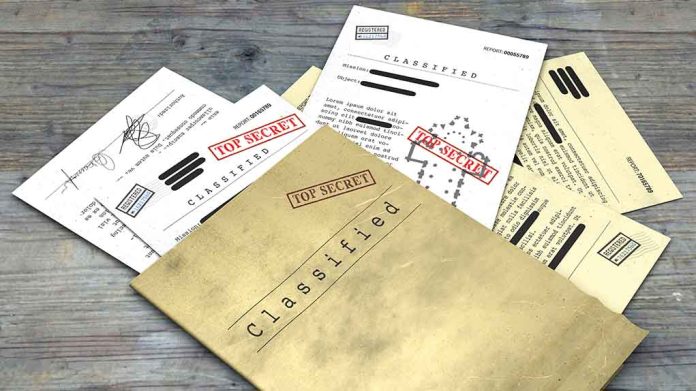
The U.S. government is scrambling to investigate a concerning leak of classified reports detailing Israel’s military strategies against Iran, raising significant diplomatic tensions.
At a Glance
- U.S. investigates classified documents leak concerning Israeli military plans against Iran.
- Investigation confirmed by U.S. House Speaker Mike Johnson.
- Documents detail military strategies, but no nuclear weapon involvement.
- Importantly impacts U.S.-Israel-Iran relations and security frameworks.
Leak of Classified Reports Raises Alarm
Authorities in the United States have launched an investigation following the leak of two classified intelligence reports outlining Israel’s military strategies against Iran. The documents, attributed to the U.S. Geospatial-Intelligence Agency and National Security Agency, highlight strategic military preparations, including air-launched ballistic missiles and drone surveillance. The leaked information, dating back to October 16 and made public on October 17, omits details on potential targets in Iran or the use of nuclear weapons. Instead, the focus lies on Israeli systems such as Rocks missiles, and possibly Blue Sparrow missiles.
The breach, making rounds on the Telegram app, reportedly stems from a Tehran-based channel supporting Iran’s “axis of resistance.” U.S. House Speaker Mike Johnson confirmed the investigation during a recent press briefing and expressed serious concerns surrounding the event. Steve Johnson stated, “There’s some serious allegations being made there.” The Pentagon has acknowledged the reports without offering specific comments on the situation.
Highly classified U.S. intelligence documents that appeared online Friday show Israel's plans to attack Iran. https://t.co/FdXZtEVVVj
— FOX6 News (@fox6now) October 21, 2024
Implications on US-Middle East Diplomatic Relations
The intelligence leak presents potential ramifications for diplomatic relationships in the Middle East, specifically impacting U.S.-Israel-Iran interactions. With the confidential details of Israel’s defense strategies exposed, questions arise about the integrity and security of shared intelligence. The United States has urged Israel to pursue a ceasefire in Gaza and exercise restraint to prevent military operations from expanding into Lebanon. Some analysts suggest the nature of the leak signifies possible discomfort within U.S. defense circles regarding the severity of Israel’s anticipated response to Iran’s ballistic missile assault on October 1. Observers note that “The leaked documents show the U.S. estimates the Israeli response to Iran will be significant.”
A few thoughts on the leaked docs, if they’re legitimate:
1. Reveals highly sensitive geo-spatial intel, showing US capabilities—& gaps—in US spying on Israel.
2. Shows definitively that US does not know precisely what Israel is planning, and has to spy to gain understanding. https://t.co/HRVobVwOXv
— Zach Dorfman (@zachsdorfman) October 19, 2024
Similarities to Past Intelligence Breaches
This incident mirrors previous intelligence leaks, such as those by Jack Teixeira involving sensitive documents related to Russia’s military actions in Ukraine. Such breaches emphasize the growing threat of unauthorized exposure of critical information. This highlights the necessity for enhanced security measures to protect diplomatic and national security interests. In the current investigation, authorities are examining whether the leak occurred due to hacking or an intentional insider action. As the investigation unfolds, the situation continues to put U.S. foreign policy objectives and international relationships under scrutiny.
The leak’s impact extends to ongoing military operations in the region. These developments occur amid existing tensions, with Colonel Ehsan Daxa, a high-ranking Israeli military officer, recently killed in intense fighting in Gaza. This marks the fourth senior loss for the Israeli Defense Forces in the current conflict. Such events intensify the already volatile regional landscape, underscoring the pressing need for diplomatic and strategic restraint by all involved parties.
Sources:
- US investigates leaked documents alleging Israel plans to attack Iran
- Pentagon Leak Points to U.S. Discomfort Over Strength of Israel’s Potential Response to Iran
- Speaker Johnson: Feds Investigating Leak of Israel Plans
- The US is investigating an unauthorized release of classified documents on Israel’s Iran attack plan










